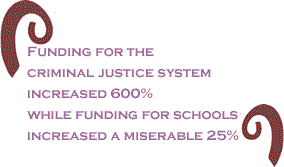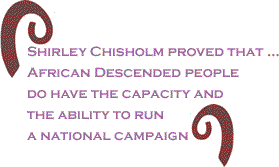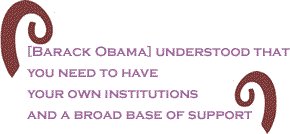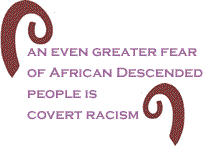| |
|
|
|
|
| |
On
August 28, 2008, Barack Obama made history by standing before
an audience of 85,000 in INVESCO Field at Mile High stadium accepting
his nomination as a presidential candidate of the Democratic Party.
At least 35 million people were watching on television while Barack
Obama and family stood before the world and declared a new day
has arrived with a sense of hope and purpose. But for 36.4 million
people of African descent, they will break down in tears of joy
knowing that life in the United States has
not been a crystal stair. They know that for Barack Obama and
for another 36.4 million people of African descent this moment
in history was not easy or clear.
Why
is this moment historic?
To
people of African descent living in the United
States, Obama represented many years of hope,
false starts, failures and fears. Let me begin with hope. Peoples
of African descent in the United
States have known capture by slave traders,
the middle passage and enslavement for almost 300 years. During
those terrible periods, African Descended people maintained hope
for a better life. They did not give up hope and sometimes they
fought back in open rebellion or quiet resistance. As one spiritual
song said:
O
freedom, O freedom,
O freedom after a while,
And before I'd be a slave, I'd be buried in my grave,
And go home to my Lord and be free.
The
Civil War ended formal slavery and for the short period of Reconstruction
African descended people burst forth into United
States politics. Laws were passed providing
for public education for all, equality of voting, and economic
development. The reconstruction period ended with massive violence
which forced African Descended people back into a new form of
slavery – Jim Crow. For the next sixty years African Descended
people were faced with the most brutal forms of exploitation,
segregation, and racial subordination. During the Jim Crow period,
African Descended people never once gave up on hope for a better
life. They traveled north to Detroit, Chicago,
Cleveland, New York and
the West coast (Los Angeles, San Francisco, Oakland, Sacramento, and Seattle). They
fought battles on the legal front, political front, from the school
to the hospital ward. Or as W. E. B. Dubois wrote in 1897, that
African Descended people:
“still
press on, they still nurse the dogged hope, - not a hope of
nauseating patronage, not a hope of reception into charmed social
circles of stock-jobbers, pork-packers, and earl-hunters, but
the hope of a higher synthesis of civilization and humanity,
a true progress, with the chorus ‘Peace, good will to men”
By
1954, the Civil Rights movement exploded on the scene. Once again
hope was in the air. Commencing with the Brown vs Topeka Board
of Education and the 1955 Montgomery Bus Boycott launched a massive
wave of mass protest that did not end until the Vietnam War. The
passage of the Voting Rights Act of 1965, Civil Rights Act of
1964, and affirmation action laws were all tools of hope that
gave rise to the new black middle class and hope for African Descended
people. The Black power movement and the rise of the Black Panther
Party gave both militancy and hope for the youth.  By
the 1980’s, the rise of crack, gangs, poor schools, no jobs, the
collapse of the inner city, the poor and working poor African
Descended people were faced with new challenges – Post Civil Right
capitalism. During the 80’s, 90’s, and 2000’s, Black youth were
incarcerated at greater rates than white youth. Funding for the
criminal justice system increased 600% while funding for schools
increased a miserable 25%. The poor and working poor African Descended
people are faced with triple trap doors of incarceration, lack
of employment, and inadequate education. But in the midst of all
that pain and difficulty African descended people still had hope.
2Pac said this best: By
the 1980’s, the rise of crack, gangs, poor schools, no jobs, the
collapse of the inner city, the poor and working poor African
Descended people were faced with new challenges – Post Civil Right
capitalism. During the 80’s, 90’s, and 2000’s, Black youth were
incarcerated at greater rates than white youth. Funding for the
criminal justice system increased 600% while funding for schools
increased a miserable 25%. The poor and working poor African Descended
people are faced with triple trap doors of incarceration, lack
of employment, and inadequate education. But in the midst of all
that pain and difficulty African descended people still had hope.
2Pac said this best:
Baby
don't cry, I hope you got your head up
Even when the road is hard, never give up
Baby don't cry, I hope you got your head up
Even when the road is hard, never give up -Keep ya head up
Since
1619, African Descended people arriving in the United States had only hopes to keep them going.
August 28, 2008, Obama now has given many African Descended people's
a new level of hope to stand up for change.

What
about false starts and failure?
By
1964, a major political re-alignment occurred when African Descended
people gave 95% support behind the Democratic Party and opened
a new arena for political leadership. In 1968, an unknown African
Descended woman named Shirley Chisholm ran as the Democratic candidate
for New York's 12th
District congressional seat and was elected to the House of Representatives.
Shirley Chisholm would become the first African Descended woman
to go Congress. In 1972, she made a bid for the Democratic Party's
presidential nomination. Shirley Chisholm won 28 delegates during
the primary process. Shirley Chisholm campaigned hard and long
but it would only become a symbolic act. Shirley Chisholm proved
that running on a Democratic ticket can be done and that African
Descended people do have the capacity and the ability to run a
national campaign.
By
1984, Jesse Jackson understood that in order to build a national
campaign he would have to build a base outside of the Democratic
Party. Jesse Jackson's campaign was founded on building a Rainbow
Coalition as a base of support and as a vehicle to capture the
nomination of the Democratic Party. During the 1984 campaign,
he and the Rainbow Coalition were locked out of the Party.  The
Black politicians remain committed to white candidates and viewed
Jackson's campaign as
a one-time effort. However, Jesse Jackson came back in 1988, with
the Rainbow Coalition and a national campaign (institutional structure,
money, and staff) to take to all fifty states. Jessie Jackson
was on his way to becoming the first serious Black contender for
the nomination after the Michigan Democratic caucus. But the with his defeat
in Wisconsin primary race, whites viewed Jessie Jackson as a Black
candidate and white racism was not going allow a person of African
Descent to win the nomination. Although Jesse had captured 6.9
million votes and won 11 contests; seven primaries (Alabama,
the District of Columbia, Georgia, Louisiana, Mississippi,
Puerto Rico and Virginia) and four caucuses
(Delaware, Michigan,
South Carolina and Vermont), he was still a person of African descent. The
Black politicians remain committed to white candidates and viewed
Jackson's campaign as
a one-time effort. However, Jesse Jackson came back in 1988, with
the Rainbow Coalition and a national campaign (institutional structure,
money, and staff) to take to all fifty states. Jessie Jackson
was on his way to becoming the first serious Black contender for
the nomination after the Michigan Democratic caucus. But the with his defeat
in Wisconsin primary race, whites viewed Jessie Jackson as a Black
candidate and white racism was not going allow a person of African
Descent to win the nomination. Although Jesse had captured 6.9
million votes and won 11 contests; seven primaries (Alabama,
the District of Columbia, Georgia, Louisiana, Mississippi,
Puerto Rico and Virginia) and four caucuses
(Delaware, Michigan,
South Carolina and Vermont), he was still a person of African descent.
Barack
Obama was able to learn from these experiences. Living and working
as a community activist on the South Side of Chicago, he understood
that you need to have your own institutions and a broad base of
support. To people of African Descent we understand that we cannot
have a person of African Descent speaking only for us, but the
candidate needs to understand that to obtain African descended
support you have to support our core positions and serve as a
defender against right wing attacks. Obama represents the culmination
of failure and false starts of African Descended people's historical
mission to nominate a person of African descent for president
in the United States. Today, Obama is standing on the
history of false starts and failures.

Our
Fears
Most
elders of African Descent carry the fears of what racism can do
to Black leaders in the United States. The
first and most obvious fear was that Obama would be killed before
he got to the White House. White racism is very deep in the United States; African Descended people love Obama
to such a degree that they prefer him alive not winning the presidency
than dead and killing a dream. To many Blacks the word is “we
cannot afford another Martin Luther King and Malcolm X to die”.

But
an even greater fear of African Descended people is covert racism.
Covert racism prevented Shirley Chisholm from having institutional
resources to run a campaign. Covert racism prevented Jesse Jackson
from winning the nomination by viewing Jesse as a Black candidate.
Black folks did not forget the Chisholm and Jackson experiences
and believe that covert racism would befall Obama as well. In
the beginning, no pundits, political advisors and a many people
of African Descend believed that Barack Obama could overcome all
the obstacles that would be put in front of him.
On
January 3, 2008, Barack Obama won the Iowa Caucus in a state with
African descended people constituting 2.5 percent of the Iowa
state’s population. After the Iowa win, convert
racism was put into high gear in the United States. The first challenge Obama had to
faced was in January, 2008, when Bill Clinton stated, “ And there’s
no difference in your voting record and Hillary’s ever since.
Give me a break. This whole thing is the biggest fairy tale I’ve
ever seen.” Next Obama would face another attacked from one of
his own people. Robert L. Johnson, the founder of Black Entertainment
Television, raised the so-called specter of Obama's past drug
use.
 Again,
in March of 2008, Geraldine Ferraro made racist statement that
“If Obama was a white man, he would not be in this position. And
if he was a woman (of any color) he would not be in this position.
He happens to very lucky to be who he is. And the country is caught
up in the concept.” It’s clear for Ms. Ferraro that Obama's background
has no value. The fact that Obama is a graduate of Columbia University and Harvard
Law School, where he served as president of
the Harvard Law Review is of no importance. The fact that Obama
worked as a community organizer and practiced as a civil rights
attorney before serving in the Illinois Senate from 1997 to 2004
is of no importance. The fact that Obama taught constitutional
law at the University of Chicago Law School from 1992 to 2004
is of no importance. To Ferraro he is simply lucky, but to every
person of African Descent there is no luck involved but overcoming
the racial odds and hard work. Again,
in March of 2008, Geraldine Ferraro made racist statement that
“If Obama was a white man, he would not be in this position. And
if he was a woman (of any color) he would not be in this position.
He happens to very lucky to be who he is. And the country is caught
up in the concept.” It’s clear for Ms. Ferraro that Obama's background
has no value. The fact that Obama is a graduate of Columbia University and Harvard
Law School, where he served as president of
the Harvard Law Review is of no importance. The fact that Obama
worked as a community organizer and practiced as a civil rights
attorney before serving in the Illinois Senate from 1997 to 2004
is of no importance. The fact that Obama taught constitutional
law at the University of Chicago Law School from 1992 to 2004
is of no importance. To Ferraro he is simply lucky, but to every
person of African Descent there is no luck involved but overcoming
the racial odds and hard work.
Once
again Bill Clinton could not keep his month shut when he compared
Obama's win South Carolina to that of Jesse Jackson. On May 8, 2008,
Senator Hillary Clinton made a statement that, “Senator Obama’s
support among working, hard-working Americans, white Americans
is weakening again, and how whites in both states who had not
completed college were supporting me.” In other words, white electors
will support a white woman before they will support a person of
African Descent. Next, Obama had to pass a racial litmus test.
 In
1984, Jesse Jackson failed the racial litmus with his connection
with Louis Farrakhan. Obama was forced to disavow any connection
with Rev. Jeremiah Wright. At a news conference on April 29, 2008,
Barack Obama stated that Wright's remarks were “a bunch of rants
that aren't grounded in the truth”. To the white electorate he
had passed the racial litmus test. The African American community
understood that Rev. Jeremiah Wright was speaking truth to power.
However, speaking truth to power is un-welcome in United States politics. In
1984, Jesse Jackson failed the racial litmus with his connection
with Louis Farrakhan. Obama was forced to disavow any connection
with Rev. Jeremiah Wright. At a news conference on April 29, 2008,
Barack Obama stated that Wright's remarks were “a bunch of rants
that aren't grounded in the truth”. To the white electorate he
had passed the racial litmus test. The African American community
understood that Rev. Jeremiah Wright was speaking truth to power.
However, speaking truth to power is un-welcome in United States politics.
The
Clintons, Johnson, Ferraro attacks and the dumping of Rev. Wright
were all designed to undermine Obama's broad base of support.
The media was on a constant drumbeat to racialize Obama. The media
attempted to wrap Obama in the so-called elites, inexperienced,
and not acceptable to white people cloth. The fear of covert racism
gave many people of African Descent reasons to be concerned that
Obama would be robbed of the nomination. Today, Obama has people
of African Descent's fears on his shoulder.
When
on August 28, 2008, Barack Obama walked into the convention and
declared, “America, This Is Our Moment”; people of African
Descent interpreted the declaration as “This is our Historic Moment”.

BlackCommentator.com
Guest Commentator, Carl Pinkston, is the Education Chair of the
Sacramento Area Black Caucus. Click here
to contact Mr. Pinkston.
|
|
|
|
|
Any BlackCommentator.com article may
be re-printed so long as it is re-printed in its entirety and full
credit given to the author and www.BlackCommentator.com. If the
re-print is on the Internet we additionally request a link back
to the original piece on our Website.
Your comments are always welcome.
If you send us an eMail message
we may publish all or part of it, unless you tell us it
is not for publication. You may also request that we withhold
your name.
Thank you very much for your readership.
|
|
| |

Your comments are always welcome.

|
|
September 18, 2008
Issue 291 |
 is
published every Thursday
is
published every Thursday
|
Executive Editor:
Bill Fletcher, Jr. |
Managing Editor:
Nancy Littlefield |
Publisher:
Peter Gamble |
| Est. April 5, 2002 |
Printer Friendly Version
in resizeable plain
text format or pdf
format. |
|
|
|
| Frequently
Asked Questions |
|
|
|
|
|
|
|
|
| |
 |
 |
|
 |
| |
| |
|
|
|
|
|
| |
| |
|





































 By
the 1980’s, the rise of crack, gangs, poor schools, no jobs, the
collapse of the inner city, the poor and working poor African
Descended people were faced with new challenges – Post Civil Right
capitalism. During the 80’s, 90’s, and 2000’s, Black youth were
incarcerated at greater rates than white youth. Funding for the
criminal justice system increased 600% while funding for schools
increased a miserable 25%. The poor and working poor African Descended
people are faced with triple trap doors of incarceration, lack
of employment, and inadequate education. But in the midst of all
that pain and difficulty African descended people still had hope.
2Pac said this best:
By
the 1980’s, the rise of crack, gangs, poor schools, no jobs, the
collapse of the inner city, the poor and working poor African
Descended people were faced with new challenges – Post Civil Right
capitalism. During the 80’s, 90’s, and 2000’s, Black youth were
incarcerated at greater rates than white youth. Funding for the
criminal justice system increased 600% while funding for schools
increased a miserable 25%. The poor and working poor African Descended
people are faced with triple trap doors of incarceration, lack
of employment, and inadequate education. But in the midst of all
that pain and difficulty African descended people still had hope.
2Pac said this best:
 The
Black politicians remain committed to white candidates and viewed
The
Black politicians remain committed to white candidates and viewed


 Again,
in March of 2008, Geraldine Ferraro made racist statement that
“If Obama was a white man, he would not be in this position. And
if he was a woman (of any color) he would not be in this position.
He happens to very lucky to be who he is. And the country is caught
up in the concept.” It’s clear for Ms. Ferraro that Obama's background
has no value. The fact that Obama is a graduate of
Again,
in March of 2008, Geraldine Ferraro made racist statement that
“If Obama was a white man, he would not be in this position. And
if he was a woman (of any color) he would not be in this position.
He happens to very lucky to be who he is. And the country is caught
up in the concept.” It’s clear for Ms. Ferraro that Obama's background
has no value. The fact that Obama is a graduate of 




